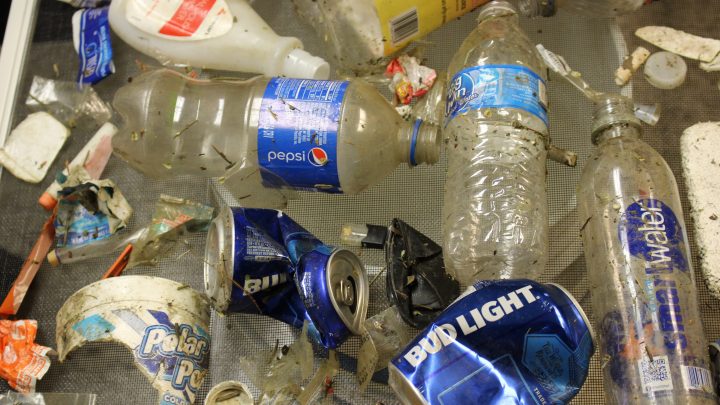
Who’s responsible for the plastic waste in our waterways?

Plastic waste in oceans and in rivers is a problem for wildlife and the broader environment. Where is that plastic waste coming from? And what’s the best way to keep it out of our waterways?
Penn State chemistry professor Sherri Mason is trying to answer those questions. She has spent a lot of time collecting trash near an industrial area at Mill Creek in Erie, Pennsylvania.
“Well, you’ll notice that the vast majority of it is either Styrofoam or bottles,” she said. “It’s a lot of plastic bottles.”

Mason comes here a few times a week with a large rake and pulls up litter. Her students will later categorize it by product, material, and type of container. Mason notes each cup and bottle as it blows in.
“I can’t see the brand on that one. I’m very interested in the brands,” Mason said. She’s interested because she wants to know the source of the trash, to provide detailed data about what’s in the waters — bags, cigarette butts, bottles — for cities considering plastic bans.
Also, Mason wants to trace it back to the companies that make those products, such as Coca-Cola.
Volunteers for nonprofit Break Free From Plastic collect plastic trash once a year across the globe. Coca-Cola topped its list in 2018 and 2019, followed by Nestle and PepsiCo.
“I’m not surprised that that would be the finding,” said Bruce Karas, Coke’s vice president of Sustainability in North America. Coca-Cola packaging shows up so often, he said, because the company has such a big share of the bottled beverage market.
Coke wants to improve collection of plastic bottles to reduce trash, Karas said, adding that the plastic can be manufactured into other products.
“We compete heavily with the fiber industry, with the carpeting industry,” Karas said. “People want that. It’s the number-two most valued commodity in the waste stream today, behind aluminum.”
The average Coke bottle is made with 10% recycled plastic, according to Karas. The company’s goal is 50% by 2030. Pepsi’s goal is to use 25% recycled plastic by 2025. But recycled plastic is more expensive than the new plastic.
“Ideally you would think that a recycled material should be cheaper. And, today, it’s not,” Karas said.
Cheap natural gas is fueling an increase in new plastic production, and China has stopped taking plastic waste from the U.S., reducing the market for U.S. recyclables. Many recycling programs around the country are now collapsing.
In October, Coke, Pepsi and Keurig Dr. Pepper, maker of plastic coffee pods, announced a $100-million-dollar joint effort to improve plastic recycling programs in different parts of the country.
“The game is really: ‘Can I get efficient enough so I get those costs in line, so it’s either at parity pricing or better?’” Karas said.
Duane Stanford, editor of the trade journal Beverage Digest said that consumers and shareholders are looking to companies to find real solutions to plastic pollution, not just make token efforts.
“We’re at the stage where companies, because it’s so important to how consumers react to their products, and therefore so important to their bottom line, have to make it a fundamental part of how they do business,” Stanford said.
At Mill Creek, Sherri Mason sees bottle labels that ask consumers to “Please Recycle,” but she said the burden for reducing plastic waste needs to be on the companies.
“You know, you make the product,” she said. “It’s up to you to make sure that it gets properly taken care of.”
There’s a lot happening in the world. Through it all, Marketplace is here for you.
You rely on Marketplace to break down the world’s events and tell you how it affects you in a fact-based, approachable way. We rely on your financial support to keep making that possible.
Your donation today powers the independent journalism that you rely on. For just $5/month, you can help sustain Marketplace so we can keep reporting on the things that matter to you.


















